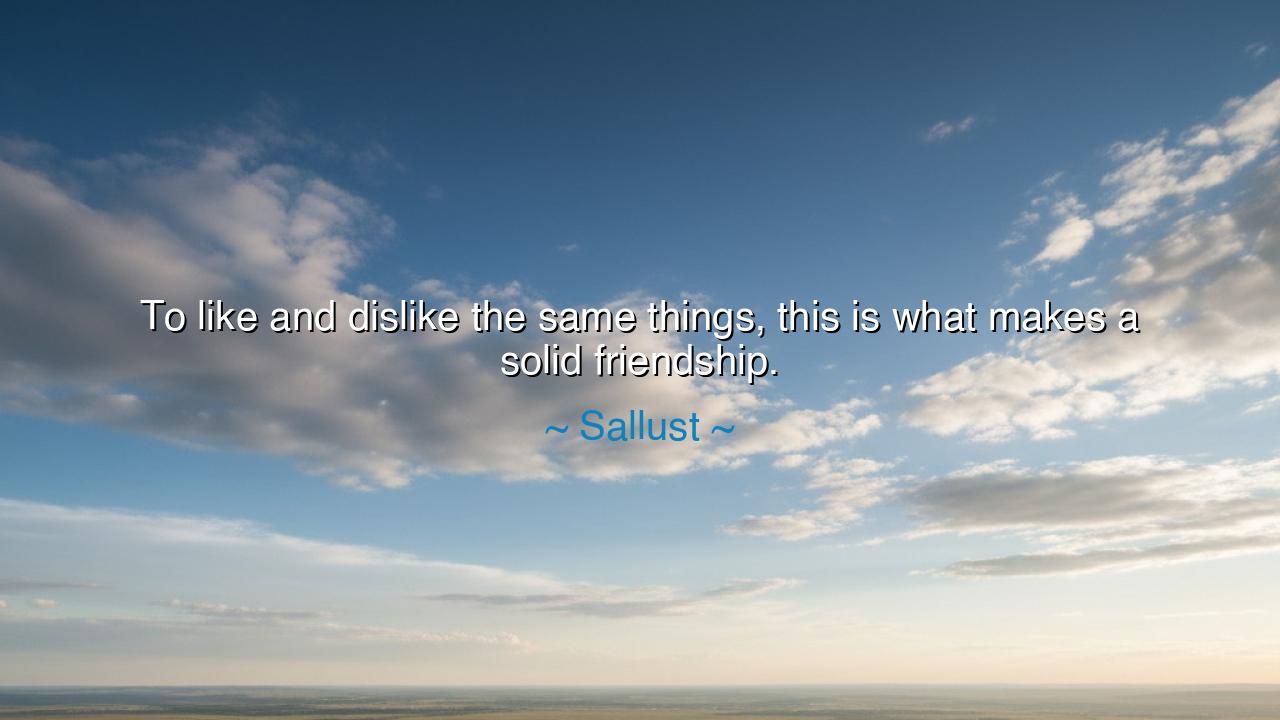
To like and dislike the same things, this is what makes a solid






"To like and dislike the same things, this is what makes a solid friendship." — Sallust
In the journey of life, where men and women walk their paths in search of meaning and connection, there is a bond that surpasses all others—the bond of friendship. But what is it that truly forges this connection? What makes one soul stand beside another, unyielding through the storms of life? Sallust, the Roman historian and philosopher, offers a profound insight into the nature of friendship: it is the alignment of hearts, the deep and unspoken understanding that comes from sharing not just joys and passions, but also the dislikes, the things that bring us together in mutual opposition. To like and dislike the same things, says Sallust, is the foundation upon which a friendship is built.
This idea of shared values and shared repulsions resonates deeply with the teachings of the ancients. Aristotle, in his work on friendship, described three types of bonds: those based on utility, those based on pleasure, and those based on the highest form of virtue. It is this highest form of friendship, grounded not in superficial attraction or fleeting convenience, but in the mutual understanding of what is good and what is bad, that forms the strongest and most enduring connections. True friends, he taught, are not merely companions in pleasant moments, but are bound together through their shared principles, their love for the same ideals and their opposition to the same vices.
Consider the legendary friendship between Jonathan and David, two of the greatest figures in biblical history. Their bond was not one built on shared interests in the material world or the pursuit of personal gain. Rather, it was their mutual respect for virtue and loyalty that bound them. Both understood the importance of honor and righteousness, and together, they stood steadfast in their commitment to these ideals, even in the face of tremendous adversity. Their shared dislikes—such as deceit and dishonor—were as integral to their bond as their shared admiration for each other’s courage and wisdom. Their friendship was rooted not in the fleeting things of life, but in the enduring values that both held dear.
A more modern example might be found in the bond between Martin Luther King Jr. and Ralph Abernathy, two men whose friendship was not merely built on shared ambitions, but on their mutual dislike of injustice and inequality. Their hearts were united not only by their shared love of freedom and equality but also by their fierce opposition to the oppressive forces that sought to tear the fabric of humanity apart. Their friendship, tested in the fires of the Civil Rights Movement, was cemented by their shared purpose and the dislike of the world as it was, knowing it could and should be better. This shared vision and opposition to the injustice of their time made their friendship solid, unshakable, and enduring.
Thus, Sallust’s words carry a deep truth: it is not enough for friends to be drawn together by similarities alone. True friendship arises when two souls are aligned not only in what they love but in what they reject. Shared ideals, shared values, and even shared dislikes form the foundation of a friendship that stands the test of time. In a world that often seeks to divide us by our differences, this lesson is even more crucial today. It reminds us that it is not merely agreement in matters of interest or hobby that forges lasting bonds, but the ability to walk together in opposition to that which is harmful, unjust, or false.
What then, dear listener, is the lesson to take to heart? The first is to recognize that friendship is a sacred bond, not to be taken lightly or built on fleeting commonalities. Seek those who share not only your passions but also your deepest values and dislikes. Let your friendships be founded on shared opposition to that which diminishes the human spirit: hatred, injustice, and dishonor. Let your hearts beat together in solidarity against the forces that divide us, for it is in this shared stance that the deepest and most enduring friendships are formed.
As you walk your path in this world, let your relationships be those that reflect the deep unity of shared purpose and mutual respect. Nurture friendships that transcend the trivial and the superficial, and that are forged in the fires of shared adversity and common ideals. For in the end, friendship is not just about enjoying the same things, but about standing firm together in opposition to that which does not serve the good, and celebrating together the virtues that bind us as human beings. Through this, you will find that true friendship—one based on shared values and mutual respect—is a treasure that lasts beyond the fleeting moments of life.






AAdministratorAdministrator
Welcome, honored guests. Please leave a comment, we will respond soon